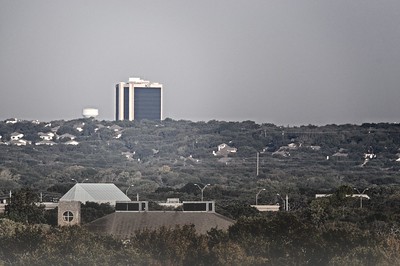I read a story the other day about the Austin Community College trustees. ACC owns a 10-story office tower, which sits on Highway 290 in Austin, TX. The structure is 37 years old. In 1990, the trustees acquired the building and transformed it into ACC’s Pinnacle Campus.
Its transformation has not been without hiccups. The initial contractor built the tower on spec. Without a clear understanding of what its tenants would want, the contractor made certain design decisions that affect ACC’s ability to use the space. Some classrooms are too small. Others lack standard classroom amenities. (You get the idea. After all, it was originally an office tower, right?)
In 2017, a sprinkler head broke in a stairwell in the building. The flood caused significant damage to the drywall in the area, among other things. In 2018, as the building’s maintenance and upkeep problems mounted, the Trustees closed the building.
After having the building professionally assessed, the trustees decided to sell the space, along with the approximately 9 acres it sits on. ACC intended to keep the remaining 49 acres adjacent to the site. The building’s costly maintenance and need for significant interior redesign and rehab weighed heavily on their decision.
Long story short: ACC listed the property in 2019 and fielded no acceptable offers.
Last year, the Texas Department of Transportation gave final approval to expand Highway 290, the road on which the Pinnacle Campus sits. Known as the Oak Hill Parkway project, the $675M expansion will take about five years to complete. Calling it an expansion actually minimizes the project. The plan will widen Highway 290 to 12 lanes. It will also create elevated interchanges along the route.
What happens when community college trustees listen to their constituents
Earlier this year, the Austin Community College trustees negotiated a contract with one of the project contractors to use the otherwise empty Pinnacle Campus parking lots as a staging site for construction equipment and materials. The agreement calls upon the contractor to pay the building’s maintenance and upkeep costs for the duration of the lease. In the original agreement with the contractor, the Trustees permitted the contractor to use the space as a batch plant for mixing cement. It takes a lot of cement to make a 12-lane anything. It also takes a lot of money to maintain an empty, unsalable 10-story building.
Residents of the area, who have been fighting the Oak Hill Parkway project since the early 1990’s, threw a fit. ACC Trustees amended the agreement to prohibit the creation of a concrete batch plant on the Pinnacle Campus site. One trustee, Julie Nitsch, explained the modification.
“We are not here to help that road get built, we are here as an educational institution,” she said. “Speaking from my elected position, I don’t see how this benefits ACC. It welcomes a lot of community outrage that we don’t need, and we will need a bond to rebuild that campus.”
For regular readers, I just wanted to point out what happens when you have community college trustees who:
- Listen to the community instead of ignoring it
- Understand that they’re accountable to the community
- Respect the voters
- Are willing to walk away from money based on the needs of the community
We don’t have any of that at WCC. Please remember that the next time you vote.
Photo Credit: Ronnie Pitman , via Flickr





















